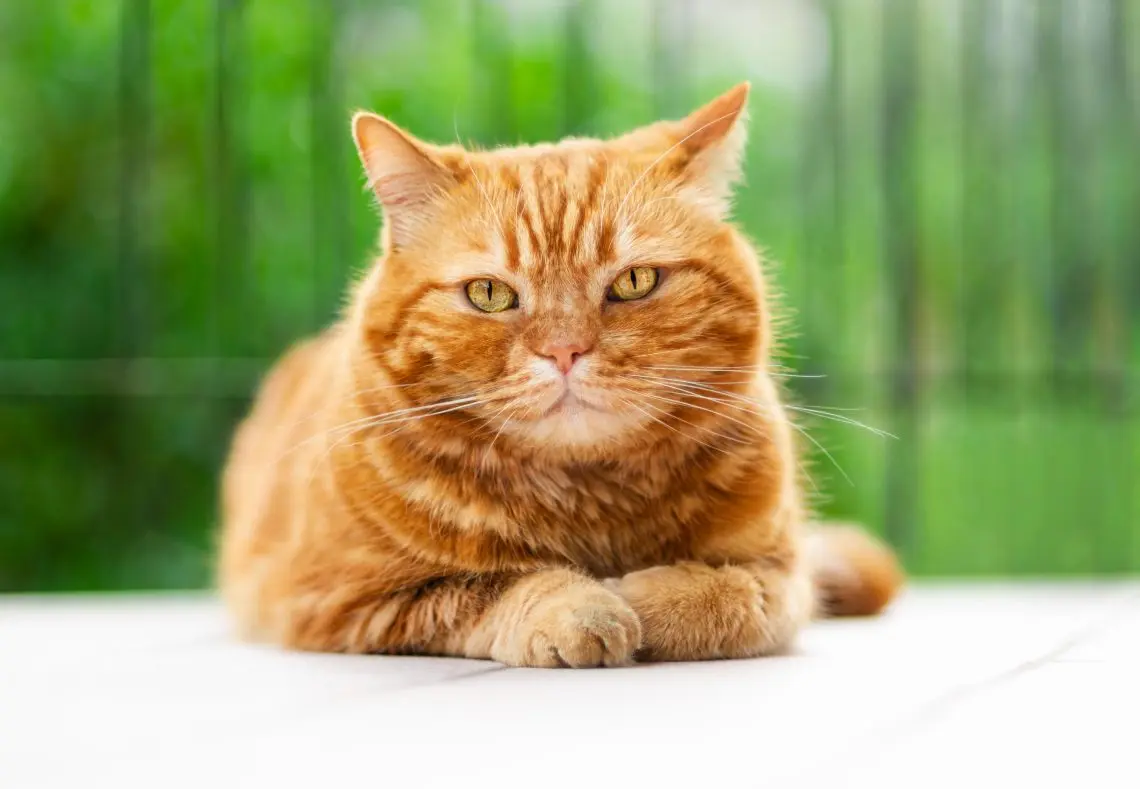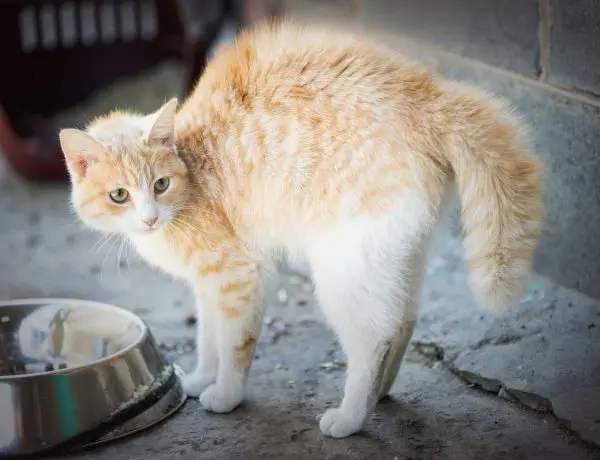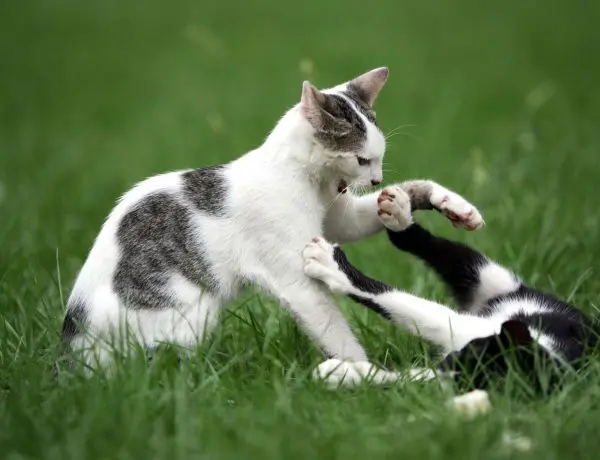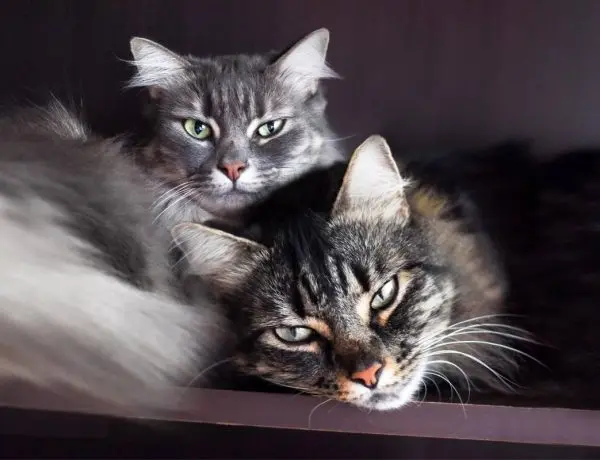Orange cats are often portrayed as being more cuddly or smarter than other cats. Someone looking to adopt a new feline may be wondering if an orange one will be an affectionate addition to their family. But does color really make a difference in a cat’s personality?
To answer if orange cats are more friendly and intelligent than any other color – no. Each cat has its own personality, which is affected by how it was cared for while it was young, as well as the environment in which they live. A cat’s color does not determine their personality, but the breed of a cat can predispose them towards being more affectionate or intelligent.
While the color of a cat’s fur may not always indicate the type of personality they have, there are reasons why this belief has become common among cat enthusiasts.
Read on to find out more about cat behaviors and the connection between coat color and personality.
Table of Contents
Are Orange Cats Really More Friendly and Intelligent?
Many cat owners would argue that orange cats are more affectionate and quick-witted than other cats. This may be due to a number of factors. For one, orange cats are very popular and tend to get adopted quicker than their gray or black peers. In addition, the color orange has often been associated with:
- Warmth
- Friendliness
- Cheeriness
These may be reasons why people assume orange cats will be friendlier. However, despite many studies being conducted over the years, it has never been proven that orange cats are any more friendly or smarter than cats of other colors.
Does Coat Color Affect a Cat’s Personality?
The color of a cat’s fur does not directly seem to determine what its disposition will be. Anyone who has ever owned cats of the same color can tell you that each one had its distinctive personality. What really influences how a cat will behave actually lies in something called socialization. Socialization factors include:
- How early the cat was taken from its mom
- The kind of treatment the cat had while young
- The environment they live in
- How the owner interacts with their cat
These elements play a significant role in how a cat’s personality will develop and whether they will be happy and secure, or timid and shy.
Socialization And Personality – Bonding With Mom
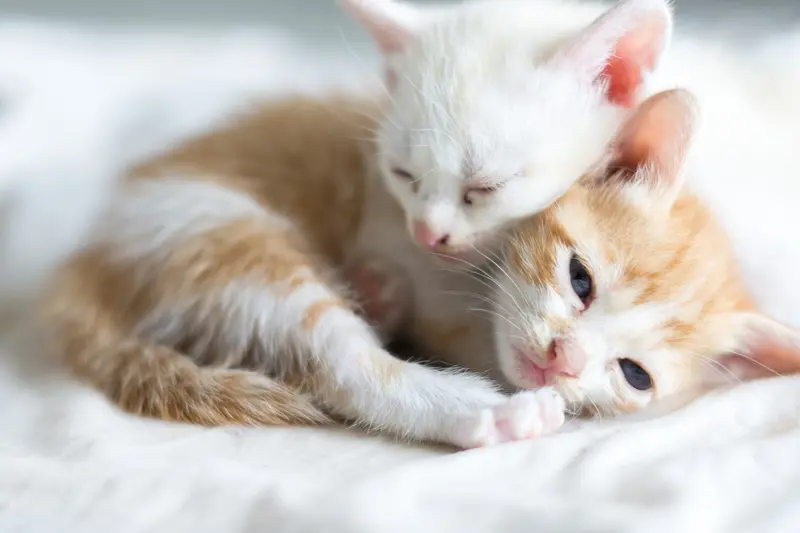
The early months in a cat’s life are instrumental in raising a loving, playful, and cuddly cat. Veterinarians recommend keeping kittens with their mom for the first four weeks of their lives at least (but 8-12 weeks is better). This gives kittens time to:
- Bond with their mother
- Grow stronger
- Develop a feeling of security
- Build their confidence
Bonding with Humans
A robust and confident cat is a pet who will be more apt to take risks, cuddle with their owners, and explore new territories.
In addition to time with mom, people should also handle kittens for the first 12 weeks. They should have time to play with humans while growing accustomed to being picked up and petted. Vets typically say that these first few months are key to helping a kitten grow into an affectionate cat.
A Positive Environment
In addition to the early months of their life, a cat’s personality is also affected by the environment in which they live. A noisy, dangerous environment will produce a jittery cat that hides under the bed at any loud noise.
A calm, predictable environment filled with plenty of stimulating toys and safe places to sleep will help a cat to feel comfortable – and thus, friendlier.
Factors that may make or break a peaceful environment for a kitten include:
- Small children
- Other pets
- Lack of quiet places to sleep
- Yelling or Loud noises
Although not deal-breakers, each of these should be taken into consideration, especially if the cat is showing signs of stress. As an example, many cats get along well with small children, as long as they are not allowed to hurt or harm the animal. The same thing applies to other pets. Many animals enjoy the companionship, but it will be essential to keep an eye out to ensure the animals are getting along.
Owner Interactions
Lastly, a cat will respond to how their owner interacts with them. Certain personality traits of a human can affect a pet’s behavior. For example, if the owner yells a lot, or is generally aggressive, their kitten may become more timid.
These traits in an owner can result in a cat that will be less likely to show affection.
The owner may then label the cat as “unfriendly” – not realizing their pet is merely responding to their human’s behaviors. Before assuming the cat is the problem, consider how you behave around it and interact with it. Many cats respond well to slow movements at first, or by giving them space to come to you when they are ready. In addition, giving cats a treat once in a while can help them bond with you!
Cat Breeds and Personality
Along with socialization, personality can be affected by other things. For example, specific cat breeds tend to have certain personality characteristics. Believe it or not, an orange-colored cat is not one specific breed but can occur in various breeds. As such, the breed of the cat has more influence on intelligence and friendliness than the color of its fur.
Cat Breeds That Can Be Orange Cats
As mentioned above, orange fur can be found among a variety of cat breeds. These breeds all have different temperaments and are known for having different levels of intelligence and affection. Here are some common breeds that feature cats with orange fur:
- Munchkins
- Egyptian Maus
- British Shorthairs
- Bengals
- Maine Coon Cats
- Abyssinians
- Persians
- American Bobtails
In addition to these registered cat varieties, many orange cats do not fall into a specific breed but are considered “mixed breed” or a generic Domestic Short Hair (DSH) variety. Many of the orange cats that are commonly kept as house pets would fall into this last category.
Just What Is an Orange Cat?
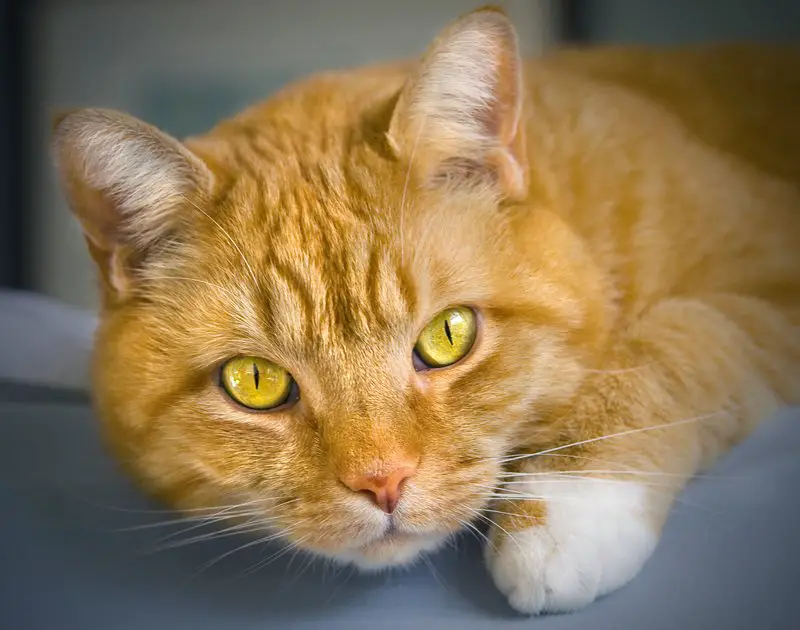
So if orange cats are not their own breed, just what are they? Orange cats are commonly referred to as “tabbies.” Not all tabbies are orange, but – all orange cats are tabbies! The defining feature of a tabby is that they all have stripes. So, every orange cat also has stripes, no matter what their breed.
Orange cats get their color from a pigment in their fur. This pigment, called pheomelanin, is the same one that creates the coloration that red-headed humans have. The amount of pheomelanin in the fur can create a variety of orange shades. These include orange tabby cats that are:
- Yellow
- Orange
- Brown
- Cream
- Golden
No matter how light or dark their orange fur, all tabbies will have stripes. Some are less obvious than others, depending on how the stripes contrast against the fur’s primary color. Sometimes the stripes will be quite bold, like a bright white, for example, while others will be barely a shade or two lighter than the rest of the fur. No matter if they are Abyssinian, Persian, or American Bobtail, or any other breed or mix, they will have stripes if they are orange.
Are Orange Tabby Cats all Male?
There is a common belief that orange tabby cats are all male, and this is almost true! In fact, 80% of orange cats are male, and only 20% are female. This phenomenon is due to the cats’ genetics. In order to get the orange coloration, cats must inherit a specific set of genes. Males only need one such gene present in order to inherit the orange color, whereas female kittens need both parents to pass the gene to them. Therefore, female orange tabby cats are much more rare!
The Most Intelligent Cat Breeds
Although the color of a cat’s fur will not necessarily determine their personality, the cat’s breed does play a significant role. If you want to adopt a smart and inquisitive cat, one way to go about this might be to discover which breeds are known for their intelligence.
Many breeds are known for their intelligence, but not all on the list are capable of featuring the orange tabby coloration – so if you are searching for a smart cat, these might be your go-to breeds:
Abyssinian – this cat breed is on the smaller side, with cats ranging from 6-10 pounds.
They have medium-length fur and are known for being highly intelligent. They love to explore and have lots of energy. They also typically get along well with other pets in the home and enjoy having a playmate (another Abyssinian, if possible). Bonus: some Abyssinians are orange tabbies!
Bengal – another breed that features orange tabbies, the Bengal is known for its tiger-like stripe pattern. Male Bengals can grow to be quite large – up to 18 pounds. They are typically very playful and fun, and can even be taken for a walk on a leash. Researchers agree across the board that Bengals are among some of the most intelligent of all cat breeds.
Burmese – although not orange, Burmese cats come in a variety of beautiful colors such as blue and platinum. They love the companionship of humans and other cats, and although vocal, let their needs be known in a less aggressive way than the Siamese. They are often likened to being dog-like in their behavior and form strong bonds with their owners.
Domestic Short Hair (Mixed Breed) – these are the “mutts” of the cat world, and are the most common type found in shelters and adoption centers. DSH cats come in a variety of colorations, including orange tabby.
They tend to be friendly and intelligent, a great combination. They are also known to be easily trained.
Siamese – although you won’t find any orange Siamese cats, their distinctive coloration and blue eyes are often admired by cat lovers. They are also known for being very vocal with their owners and love to let them know when they want something. However, they also need a lot of stimulation and toys, so they don’t decide to destroy your furniture and belongings with their active lifestyle!
Although coat color alone won’t determine a cat’s intelligence, choosing a cat from a breed that is well-known for its smart, inquisitive personality can help.
The Most Friendly Cat Breeds
In addition to intelligence, many prospective cat owners look for pets that will be friendly and outgoing. Again, orange cats aren’t necessarily guaranteed to be the most loving, but some breeds of cats are.
Here are a few that are considered to be among the friendliest of cat breeds, even though they are not all capable of being orange tabbies:
Abyssinian – Not only are they smart, but these cats are also known for being friendly. They love to snuggle, follow you around the house, and play with you. On top of that, they also have no fear of strangers – they will gladly snuggle up with a visitor and make them feel right at home. Abyssinian cats can be orange tabbies!
Ragdoll – these cats are well-known for their fluffy, soft coat and beautiful blue eyes. They are large cats and have the strange personality trait of going limp when you pick them up – hence the “ragdoll” name. So you can pick them up anytime and put them in your lap for a cuddle! They are also a little more on the mellow side and don’t mind hanging out on the couch for a while as you binge-watch your favorite show. Ragdolls can be orange as well!
Persian – this breed features beautiful cats with long, lustrous fur and distinctive flat faces. They are often found “sitting pretty” and will gladly hop into your lap for a petting session. This is another breed that can come in orange.
Burmese – another cat breed on the intelligent cat list, Burmese cats are given an honorable mention as a friendly breed as well. Not only do they love cuddles from humans, but they get cozy with all creatures.
Other pets will find the Burmese coming up to snuggle, play, and explore with them. They are also famously great with kids. This breed cannot be an orange tabby though.
Which breed Has it All?
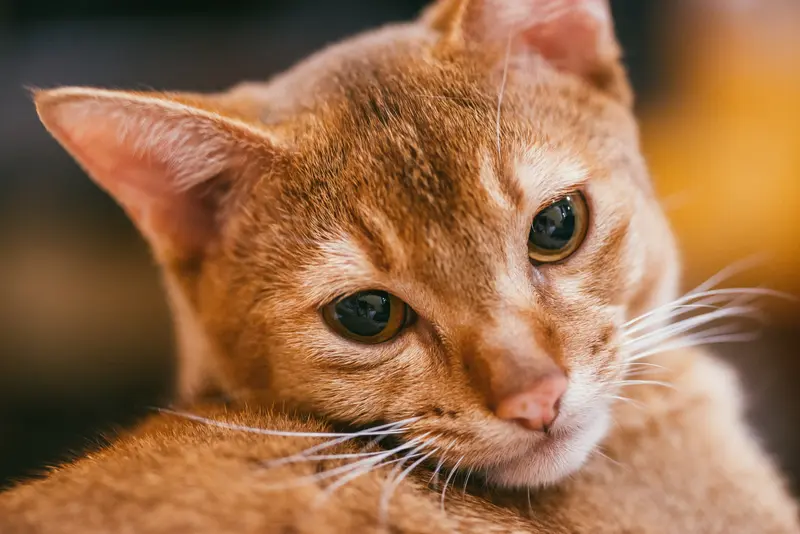
If you’re looking for a breed that is capable of having it all – intelligence, friendliness and comes with an orange tabby coloration, then the Abyssinian breed may be what you are looking for! They are intelligent, playful, loving, and bold. An “Aby” as they’re known, would make a wonderful pet for just about any cat lover.
Choosing The Right Pet
So, you’ve done your homework, and you’re ready to adopt a new pet. It’s important to remember that just because a cat is a specific color or breed, it is also an individual – and not all cats will fit the mold. The personality of a cat relies on several factors, including:
- Socialization – how they have been treated in their early weeks of life and introduced to people
- Breed – certain breeds are more predisposed to specific personality traits
- Environment – the characteristics of where a cat has spent its life will most definitely affect its personality
- Age – a young kitten will have more energy than, say, a senior pet
Keeping these factors in mind, a prospective pet owner has many options when choosing a new member of the family. Remember, the breed isn’t everything. In fact, the “mixed breed” Domestic Short Hair is not purebred, but many of them are often known to be intelligent and friendly. So when deciding on a new cat, you may consider:
Adopting an older pet
This will allow you to get to know the cat and their temperament before deciding to bring them home. Their personality will be in place – for better or worse. An older cat will be less likely to change dramatically once they get used to their new home. However, some animals who have experienced trauma, for example, can become much more friendly once they have become used to their new, more secure environment.
Adopting a young kitten
Remember, it is best to wait until the kitten is at least four weeks old before removing them from the safety of their mother. But adopting a young kitten (between 8-12 weeks) will ensure that you are able to train and groom them right from the start. A wise pet owner will start socializing their kitten, helping them get used to their environment, and grow in confidence. This can ensure your cat is friendly and loving from the very start!
Whether you choose an older pet or a kitten, the animal you adopt will be lucky to enjoy a loving, happy home. They are bound to bring their owner years of companionship and love. Although orange cats have a reputation for being more friendly and intelligent, many cats fall into this category. Cats of all colors and breeds definitely bring their own personality to spice up your home!

